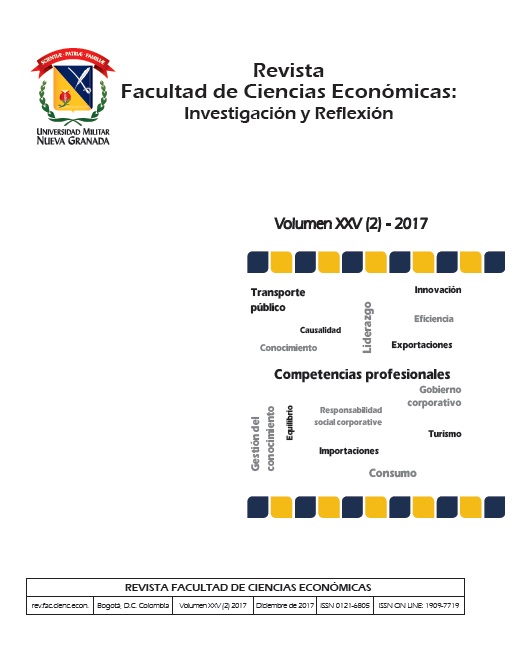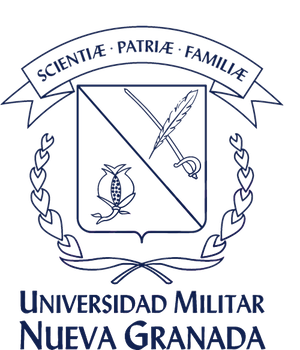Knowledge management maturity models
Abstract
The purpose of this article is to compare the 24 Knowledge Management Maturity Models (MMGC) found in the open access academic literature in: JSTOR, Emerald, Scopus, Science Direct, Taylor & Francis, Scielo, Google Scholar, EBSCO Business Source Premier and Engineering Village between 2001 and 2016. The comparison criteria used corresponded to those proposed by Martínez (2015). It was identified that the most appropriate MMGC for the GC´s maturity diagnosis execution is the Teah, Pee & Kankanhalli´s (2006) GC maturity general model.Downloads
References
Acuña, J., Gómez, M., & Pintor, M. (2014). Madurez de la gestión del conocimiento y la gestión de procesos en empresas que utilizan la plataforma virtual TALENTUM. Ciencias de La Información, 45 (2): 49–55.
Arias, J. (2012). Asociaciones entre madurez de gestión del conocimiento y desempe-o innovador: Organización y personas, e interpretación. Revista Lasallista de Investigación, 9 (1): 86–95.
Arias, J., & Tavera, J. (2015). Linking knowledge management maturity and innovation in leading companies in research and development. Revista Republicana, 18: 159–180.
Arias-Pérez, J., & Durango-Yepes, C. (2015). Exploring knowledge management maturity from funcionalist and interpretivist perspectives. Entramado, 11 (1): 94–104. http://doi.org/https://dx.doi.org/10.18041/entramado.2015v11n1.21112
Arias-Pérez, J., Tavera-Mesías, J., & Casta-o-Serna, D. (2016). Construcción de un modelo de madurez de gestión del conocimiento para una multinacional de alimentos de una economía emergente. El Profesional de La Información, 25 (1): 88–102. http://doi.org/http://dx.doi.org/10.3145/epi.2016.ene.09
Arling, P., & Chun, M. (2011). Facilitating new knowledge creation and obtaining KM maturity. Journal of Knowledge Management, 15 (2): 231–250. http://doi.org/10.1108/13673271111119673
Brice-o, M. & Bernal, C. (2010). Estudios de caso sobre la gestión del conocimiento en cuatro organizaciones colombianas líderes en penetración de mercado. Estudios Gerenciales, 26 (117): 173–193. http://doi.org/10.1016/S0123-5923(10)70140-6
Durango, C., & Pérez, J. (2013). Análisis comparativo de los modelos de madurez de la gestión del conocimiento en grandes empresas de Medellín-Colombia. Biblioteca Digital de La Asociación Latino-Iberoamericana de Gestión Tecnológica, 1 (1). Retrieved from http://www.altec-dl.org/index.php/altec/article/view/1948
Durango, C., Quintero, M., & Ruiz, C. (2013). Metodología para evaluar la madurez de la gestión del conocimiento en algunas grandes empresas colombianas. Tecnura, 19 (43): 20–36. http://doi.org/http://dx.doi.org/10.14483/udistrital.jour.tecnura.2015.1.a01
Feng, J. (2006). A knowledge management maturity model and application. Paper Presented at the Technology Management for the Global Future, 2006. PICMET 2006. https://doi.org/10.1109/PICMET.2006.296693
Follador, R. C. (2015). Knowledge Management Maturity Level in a Brazilian Air Force Flight Test Environment. 2015 Portland International Conference on Management of Engineering and Technology (PICMET), 1296–1304. http://doi.org/http://dx.doi.org/10.1109/PICMET.2015.7272952
Gaál, Z., Szabó, L., Kovács, Z., Obermayer-Kovács, N., & Csepregi, A. (2008). Knowledge management profile maturity model. Paper Presented at the Proceedings of 9th European Conference on Knowledge Management (ECKM 2008), Southampton Solent University, Southampton, UK.
González, A., Castro, J., & Roncallo, M. (2004). Diagnóstico de la gestión de conocimiento en una empresa grande de Barranquilla (Colombia): Una actividad de vinculación cooperativa universidad - sector productivo. Ingeniería Y Desarrollo: Revista de La División de Ingeniería de La Universidad Del Norte, (16): 70–103. Retrieved from http://dialnet.unirioja.es/servlet/articulo?codigo=2508538&info=resumen&idioma=ENG
González, A., Joaquí, C., & Collazos, C. (2009). Karagabi Kmmodel: modelo de referencia para la introducción de iniciativas de gestión del conocimiento en organizaciones basadas en conocimiento. Ingeniare. Revista Chilena de Ingeniería, 17 (2): 224 – 235. https://doi.org/10.4067/S0718-33052009000200011
Harris, K. (2006). Gartner A Knowledge Management Maturity Model Explains Where You ' re Going and How to Get There, (February).
Heinzen, A. (2015). Avaliação da maturidade da gestão do conhecimento na administração pública. Universidade Federal de Santa Catarina. Retrieved from http://btd.egc.ufsc.br/wp-content/uploads/2015/06/Angela-Regina-Heinzen-Amin-Helou.pdf
Hsieh, P. J., Lin, B., & Lin, C. (2009). The construction and application of knowledge navigator model (KNM): An evaluation of knowledge management maturity. Expert Systems with Applications, 36 (2 PART 2): 4087–4100. http://doi.org/10.1016/j.eswa.2008.03.005
Joslin, R. (2007). The Knowledge Management Maturity Model. CRM Magazine, 11 (11): 8–18.
Klimko, G. (2001). Knowledge management and maturity models: Building common understanding. Proceeding of the 2nd European Conference on Knowledge Management, 269–278.
Kulkarni, U., & St Louis, R. (2003). Organizational self assessment of knowledge management maturity. AMCIS 2003 Proceedings, 332.
Kuriakose, K., Raj, B., Satya Murty, S., & Swaminathan, P. (2010). Knowledge management maturity models–a morphological analysis. J Knowl Manag Pract, 11 (3).
Kuriakose, K., Raj, B., Satya Murty, S., & Swaminathan, P. (2011). Knowledge Management Maturity Model : An Engineering Approach. Journal Of Knowledge Management Practice, 12 (2): 1–14.
Martínez, J. (2015). Modelo de madurez en el dominio de los proyectos aplicado a organizaciones de Gestión de Proyectos en Medellín. Universidad EAFIT. Retrieved from https://repository.eafit.edu.co/xmlui/bitstream/handle/10784/7291/Jeferson_MartinezLozano_2015_Principal.pdf?sequence=2&isAllowed=y
Nonaka, I., & Takeuchi, H. (1995). The knowledge-creating company: How Japanese companies create the dynamics of innovation. Oxford university press.
Olarte-Reyes, M. & Lis-Gutiérrez, J. (2015) Gestión de activos intelectuales y creación de valor. Administración y Desarrollo, [S.l.], 45 (2): 190-207. ISSN 2500-5227. Disponible en: <http://esapvirtual.esap.edu.co/ojs/index.php/admindesarro/article/view/11>. Fecha de acceso: 13 ene. 2017 doi:http://dx.doi.org/10.22431/25005227.11.
Oliveira, M., Pedron, C., Romao, M., & Becker, G. (2011). Proposta de um modelo de maturidade para Gestão do Conhecimento: KM3. Revista Portuguesa E Brasileira de Gestao, 10 (4): 11–25.
Paulk, M., Curtis, B., Chrissis, M., & Weber, C. (1993). Capability maturity model, version 1.1. Software, IEEE, 10 (4): 18–27. https://doi.org/10.1109/52.219617
Paulzen, O., Doumi, M., Perc, P., & Cereijo-Roibas, A. (2002). A Maturity Model for Quality Improvement in Knowledge Management. ACIS 2002 Proceedings, 5: 1–12.
Prieto, R., Meneses, C., & Vega, V. (2015). Análisis comparativo de modelos de madurez en inteligencia de negocio. Ingeniare. Revista Chilena de Ingeniería, 23 (3): 361–371. Retrieved from http://www.scielo.cl/pdf/ingeniare/v23n3/art05.pdf
Romero, D., & Pascual, F. (2011). Análisis de madurez de la gestión del capital intelectual en la peque-a y mediana empresa latinoamericana. Revista Da Micro E Peque-a Empresa, 5 (3), 40–60.
Serna, E. (2012). Maturity model of knowledge management in the interpretativist perspective. International Journal of Information Management, 32 (4): 365–371. http://doi.org/10.1016/j.ijinfomgt.2011.12.001
Snyman, M., & Kruger, C. (2005). Formulation of a strategic knowledge management maturity model. South African Journal of Information Management, 7 (2).
Teah, H. Y., Pee, L. G., & Kankanhalli, A. (2006). Development and application of a general knowledge management maturity model. The Tenth Pacific Asia Conference on Information Systems (PACIS 2006), (Pacis), 401–416.
Uribe, A. (2013). La Gestión del conocimiento en Instituciones de Educación Superior (IES) de Medellín. Escenarios: Empresa Y Territorio, (2): 243–258.
Wibowo, M. A., & Waluyo, R. (2015). Knowledge Management Maturity in Construction Companies. Procedia Engineering, 125: 89–94. https://doi.org/10.1016/j.proeng.2015.11.014











